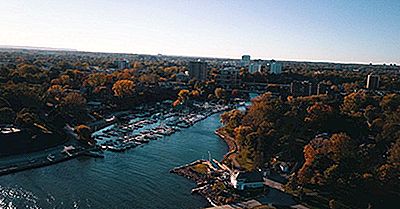About 82% of Canadians live in urban areas. Towns and cities have proven to be a preferred destination due to the proximity of the best services such as health care, education and improved infrastructure. However, Canadians and other residents looking to migrate to urban environments may still have difficulty determining which city or town they should migrate to. According to Moneysense, here are the best cities to live in Canada. Factors used to determine the adequacy of a city include economy, wealth and income, taxes, affordability of property, transportation, crime level, accessibility to health services, l art and community and weather.
10. Halton Hills – Ontario
The city of Halton Hills is located in the northwest corner of the Greater Toronto Area. It has a population of around 66,000. One of the attractions of Halton Hills is the unspoiled environment. The Niagara Escarpment designated a World Biosphere Reserve in 1990 crosses the city. The average income of $ 108,410 is higher than the national average, but the unemployment rate of 5.7% is also higher than the national average of 5.1%. Transportation is offered by a bus and rail system.
9. Saint-Lambert – Quebec
The city of Saint-Lambert is located 11, a few kilometers from Montreal, on the south shore of the St. Lawrence River. It is mainly residential but complemented by a few commercial institutions which stimulate the city’s economy. It is one of the richest cities in Quebec with a reputation for prestige. The city is served by a public transport network by bus and rail managed by the Longueuil Transport Network (RTL). Several health care and educational institutions are within reach of the community. The unemployment rate stands at 4.9% while the average household income is 83.626.
8. Westmount – Quebec
Westmount is a wealthy suburb of downtown Montreal. It has a population of around 15,000. These are mainly residential buildings occupied by the political and commercial elites of Quebec. Ten years ago, the average age of the community was between 70 and 80, but the younger generation finds its way into the enclave. Although the average income is $ 75,848, the majority of residents own their own homes. The community is located in Montreal and benefits from its proximity.
7. Canmore – Alberta
Canmore is located 50 west of Calgary on the border of Banff National Park. The city offers an outdoor lifestyle with picturesque landscapes. Canmore is the ideal place to start a family because of the social facilities available and the friendly environment. The unemployment rate in the city is 5.1% while the average income is $ 75,848. The cost of real estate in the city increases significantly, as real estate investors rush to meet the demand for real estate.
6. Milton – Ontario
The city of Milton is located in southern Ontario and is part of the Greater Toronto Area. It is home to 121,000 people. Between 2001 and 2011, it was the fastest growing city in the country, a situation that led to rapid expansion of public infrastructure and facilities. A suburban train and a bus corridor are the main public transport services. The environment is a mix of urban and rural, a feature that attracts people to settle in the city.
5. Lacombe – Alberta
The town of Lacombe is located 16 north of the Alberta town of Red Deer. It is located where the hilly countryside of central Alberta meets the prairies to create a picturesque environment. The city is served by an airport, a road and a train. He is home to about 14,000 people. The attractive environment is one of the main reasons why people migrate to Lacombe. The unemployment rate is around 4.9% while the average household income is 97,800. The property tax is significantly higher at 76.6%.
4. Saint-Bruno-de-Montarville – Quebec
Saint-Bruno-de-Montarville is a suburban city of the city of Montreal located in the southwestern part of Quebec. The city has a population of around 27,000. Most of the city’s residents work in the city of Montreal. The city’s property tax is 18.8%, which is significantly lower than that of Ottawa. The city is served by a metropolitan rail and bus network that transports commuters to and from Montreal.
3. Russell – Ontario
Russell is a community on the outskirts of Ottawa. It is a suburb of around 17,000. Russell is a great place, away from the hustle and bustle of the city. About 50% of the people are English-speaking while the remaining 50% are French-speaking. The majority of the city’s residents work for the federal government, and most travel to Ottawa. Average income is $ 112,644, which is significantly higher than the national average of about $ 70,300. An average family home costs between $ 350,000 and $ 360,000. A small population means that health and transportation services are of high quality due to low congestion.
2. Ottawa – Ontario
Ottawa is the capital of Canada and is located in the southeast of the province. Ottawa has an urban population of approximately one million and a metropolitan population of approximately X million. The city’s status as capital has made it the second most popular place in the country. The unemployment rate is around 1.4% and the average household income is $ 5.1. Transportation infrastructure and health services are among the best, while crime levels are lower than in other major cities in the country.
1. Oakville – Ontario
Oakville, Ontario has been rated as the best place to live in Canada. The city is located in the southern part of Ontario, approximately between Toronto and Hamilton. It is part of the Greater Toronto Area. The suburban city has a population of around 194,000 and a population density of 3.404 / sq mi, making it one of the most densely populated places in the country. Oakville has a good transportation, health and education system. The level of crime is also low.


